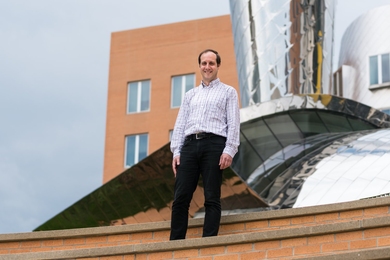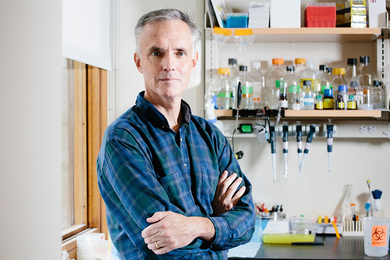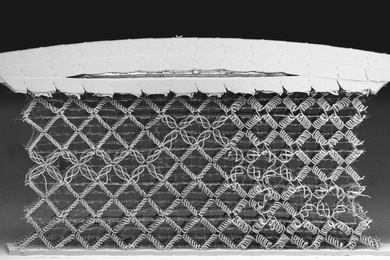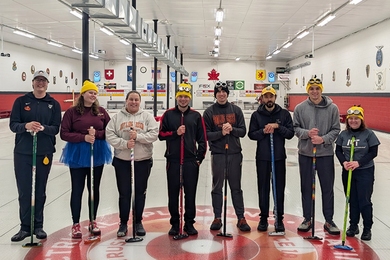Three years ago, Wissam Jarjoui faced an uncertain future in an unstable place. The Palestinian student from East Jerusalem had never met an Israeli, and he hadn't even heard of the Massachusetts Institute of Technology.
Today, 17-year-old Jarjoui finds himself part of MIT's Class of 2011. He radiates confidence as he speaks about the virtues of teamwork. And he considers several Israelis among his best friends.
Jarjoui has come a long way in those three years, thanks in part to a unique program born at MIT that was designed to bring Israeli and Palestinian youths together in an educational environment. The program, Middle East Education through Technology (MEET), was founded by Anat Binur, a graduate student in political science at MIT, her brother, Yaron Binur (S.B. 2006), and a friend, Assaf Harlap. Jarjoui was one of MEET's original participants; today he is the first MEET student to have enrolled at MIT.
"MEET literally changed my life," he says.
Jarjoui chuckles as he recalls the MEET recruiters who came to his high school in early 2004 looking for participants in what would be the program's first class.
"They told us that MIT was supporting MEET and that MIT was the top technology school in the world," he says. "At first I didn't believe it."
It was only later when he asked his brother that he realized the recruiters weren't kidding; moreover, he could see that MEET was an opportunity not to be missed.
The program certainly had its attractions, not least of which was the fact that it was free. But there were other enticements: the chance to learn computer science, teamwork and leadership skills--and, through it all, the prospect of transcending political and cultural boundaries.
Co-founder Anat Binur explains the program was not designed to create a platform for direct dialogue about the conflict in the Middle East but, rather, to empower each side through education, and to use technology as a way for students to connect though joint interests and to learn about each other.
"They come from diverse backgrounds and sit together and find a common language," she says. "In order to connect or communicate, initially it doesn't matter what language you speak or where you are from; what matters is how well you can program."
Jarjoui, who prior to starting MEET had never met someone from the other side of the Middle East conflict, says the first few days were "a little tense" but that the Palestinian and Israeli students soon found common ground.
"After those first few days we understood that we shared interests, and that made us think about one another in a different way," he says.
The MEET curriculum is based on methodology developed by faculty from the MIT Computer Science and Artificial Intelligence Laboratory and MIT Sloan School of Management. MEET is further supported by business and academic leaders from the Middle East, the United States and Europe.
MEET's ranks have grown from that first summer, when only 15 Israeli and 15 Palestinian students participated. This past summer, more than 80 students were enrolled.
Jarjoui, who hopes to study computer science, electrical engineering and management at MIT, says it is because the language of MEET is technology and not politics that it has been a success.
"From one individual's point of view, it is possible to reach a solution [to the conflict in the Middle East], but it's hard to reconcile two nations to the same solutions when they have fundamental differences," Jarjoui says.
"I believe the way to do it is to make those two groups of people interact with each other and realize that the only difference they have is what they choose. That's what MEET showed me. It gave us all a chance to explore one another without looking at the political side," he says.
And that may well be the most powerful lesson of MEET. Jarjoui notes that the program provided a platform for him and other students to cross the political divide and forge what he hopes will be lifelong friendships.
"The people I met through MEET are my best friends," he says. "MEET is a family--not just for me, but for all the MEET students."
Theodore Golfinopoulos, a second-year MIT graduate student in electrical engineering and an MIT instructor at MEET, got to know Jarjoui last summer and says the program opened the Palestinian youth's eyes to the world at large and taught him to dream big.
"Of course, most people who know about MEET's mission are more interested in its political aspects," Golfinopoulos says. "All I can say about this is that Wissam has told me that it would have been unlikely for him to make any Israeli friends were it not for MEET. I think that's a pretty powerful statement, politically, culturally or otherwise."
-Additional reporting by Karla Mansur in CSAIL
A version of this article appeared in MIT Tech Talk on September 19, 2007 (download PDF).






